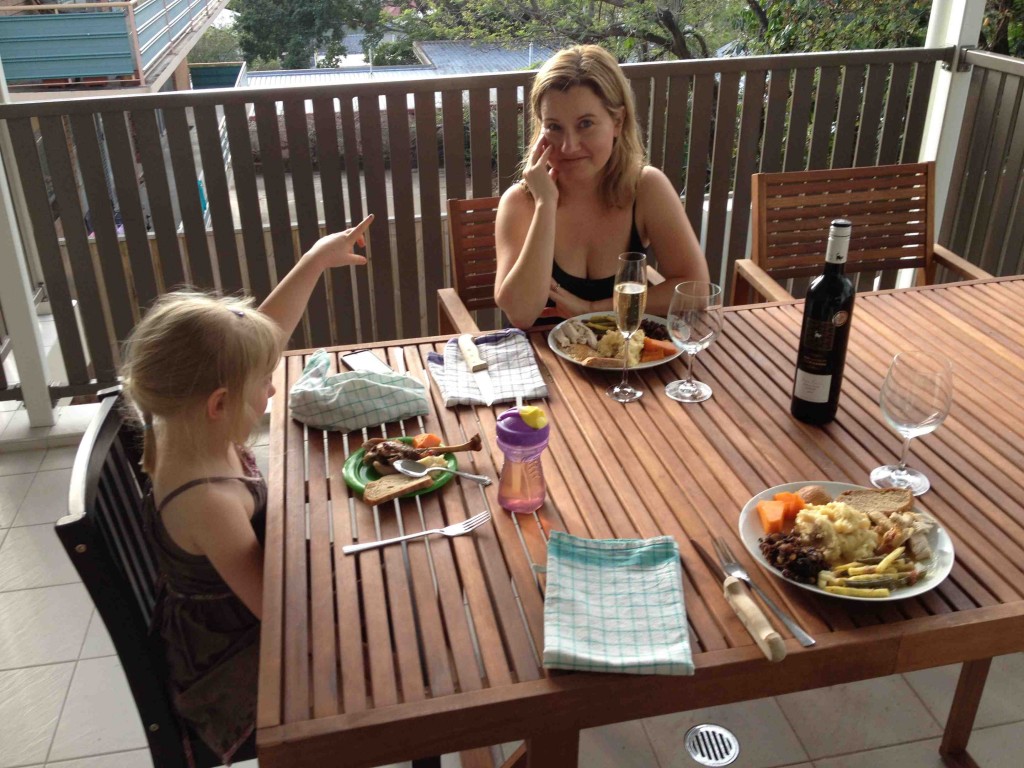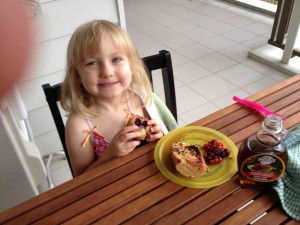Our own temperature-verified map of the world.
Tag Archives: Australia
Skippy burgers: 30 years later, details emerge of shoddy Australian meat exports
A series of articles in today’s Australian newspapers – they still exist, because it’s 1978 here – contends that Australians were unwittingly fed donkey meat, goat and maggot-ridden offcuts by some of the country’s leading meat producers, according to newly revealed Royal Commission findings.
Papers presented to Justice Albert Edward Woodward in the 1980s and made public for the first time describe Hammond Wholesale and Retail Meats trimming off the dye legally required on pet food and selling it for human consumption as well as 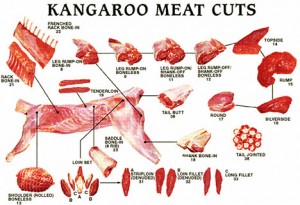 wide-spread substitution of halal meat.
wide-spread substitution of halal meat.
“The flesh of donkeys, goats, kangaroos, buffaloes and horses, killed in the field and without regard to any consideration of hygiene…was used indiscriminately to produce food for human consumption,” the report said.
Some companies passed off kangaroo, horse and other pet-food only grade cuts as human-grade mince, while others sent low-quality scraps off to be used for dim sim fillings.
Meat rejected for export to the United States from Souery Pty Ltd, was described by a veterinary officer as “rubbish and floor sweeping” and “eligible for pet food only”, but was sold to unsuspecting buyers in Adelaide.
The cleanliness standards at one Katherine abattoir in the Northern Territory were also described as filthy with “maggots … very much in evidence.”
Justice Woodward said there was no doubt Melbourne meat supply company Steiger’s Meat Supply “purchased considerable quantities of pet food which was injected into the human food chain.”
He said the owners of the business then attempted to cover up the operations and committed perjury so the scale of the operation could not be accurately assessed, but he suggested the substituted meat was freely available in Victoria and much of the east coast of Australia.
The details of the scandal have only come to light as the result of the country’s longest-running freedom of information battle by Canberra Times Editor-at-large Jack Waterford. Waterford first requested the documents in December 1982 on the day the Freedom of Information Act came into existence. After the decades-long battle he was finally given access to “appendix h” of the 1980 Royal Commission into meat substitution last week.
In total Justice Albert Edward Woodward named 35 cases requiring further investigation and or criminal proceedings.
Some, but not all, of the companies were sanctioned and faced prosecution under the Trade Practices Act as the $100 penalty imposed under the Export Act did not offer any deterrent.
The documents also name another man who operated under an alias who purchased at least 85 tonnes of pet meat in one year and repackaged it as boneless beef.
“[The man] was buying kangaroo meat from Queensland and horse meat in Victoria, ostensibly for distributing to retail pet shops but was selling at least some of the pet 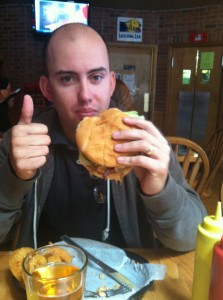 meat to dim sim manufacturers.”
meat to dim sim manufacturers.”
An owner of Hammond Wholesale & Retail Meats said he kept greyhounds and bought $160,000 of pet meat in 10 months, his purchases would have feed 3000 dogs and he admitted that about half of the meat he sold for human consumption was pet meat.
Justice Woodward also found that Jakes Meats Pty Ltd substituted buffalo-meat for export quality boneless beef or bull.
The documents also refer to previously unreported large scale substitution of halal meat.
The findings of the Royal Commission led to an overhaul of the Australian meat industry. This weeks release of “appendix h” comes more than 30 years after the main document was made available to the public. While many of the companies named faced sanctions and had export certification cancelled effectively closing down operations, some of the persons named in the appendix are still involved in the meat industry.
It started with an eagled-eyed food inspector in San Diego, California on July 27,1981 and almost destroyed the $1 billion a year beef export trade of Australia.
A vigilant food inspector became suspicious of three frozen blocks of imported Australian beef that looked “darker and stringier” than bona fide boneless beef should be.
Tests showed that this bogus “beef” from Australia was horse meat.
In the next few days more horse meat, and then some kangaroo meat, masquerading as Australian beef were found elsewhere in the United States.
By 15 August, the press in Australia and the United States had begun to probe and report on the “Meat Substitution Scandal” and the joke of ”skippy burgers” was born.
Jack Waterford himself writes he finally received the report he requested on December 2, 1982, 29 years, 11 months and about two weeks ago.
I’ve been harsh. It’s 1982.
Salmonella factories: don’t eat geckos
“Liven up your next birthday party with a visit from Brisbane Reptile Awareness!
They’ll come to you with a number of reptiles for only $120 – not the usual $240!
Interact with pythons, lizards, a salt water crocodile, long neck turtle and more!
 Touch and handle the reptiles while supervised by their specialist rangers.”
Touch and handle the reptiles while supervised by their specialist rangers.”
Which may be better than the young man who claims he reluctantly ate a lizard to avoid being bashed by a former outlaw bikie.
But forcing his mate to feast on the reptile did not stop ex-Rebel Motorcycle Club member Mark Adrian Mitchell from smashing the victim’s jaw because he then refused to continue taking part in a fraudulent eBay scheme, a court has been told.
Mitchell, 33, was yesterday jailed for four years and three months after pleading guilty in the Brisbane District Court to charges of extortion and assault causing grievous bodily harm at Sandstone Point and Banksia Beach, on Bribie Island, 50km north of Brisbane, between February and June last year.
Mitchell had earlier pleaded not guilty to a charge of torturing Mitchell Noe, 23, by forcing him to eat a Gecko if he was to avoid being bashed.
A jury was told Noe began eating the reptile, but stopped when it made him physically ill.
KFC Twister appeal in Australian settlement sucks
In April 2012, KFC was ordered to pay $8 million damages by a judge who found a young Sydney girl was left severely brain damaged after eating a Twister chicken wrap.
KFC decided to appeal.
On Friday, Justice Clifton Hoeben of the Supreme Court of NSW told Michael Jones, SC, representing the fast food chain, that his appeal submissions “don’t come within  a bull’s roar of complying with the rules.”
a bull’s roar of complying with the rules.”
“I get very little assistance from the written submissions,” Justice Hoeben said, adding there was “hardly any law there”.
“They really read as submissions that should have been or probably were made at trial,” he said.
“They are not in the form of submissions on appeal.”
A food safe breakfast: me and Sorenne
Sorenne and I often bake in the morning.
With the summer solstice approaching in Brisbane, and mornings alighting at 4:45 a.m., 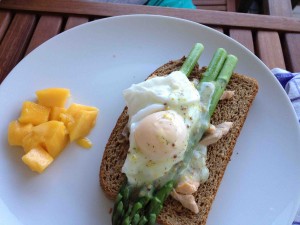 she gets up early, I get up early, and we hang out in the kitchen.
she gets up early, I get up early, and we hang out in the kitchen.
Today was whole meal muffins and French toast from some leftover baguette for the Frenchie.
I don’t let Sorenne lick the spoon and am careful not to cross-contaminate; Australia has an egg problem.
A table of Australian egg-based outbreaks is available at http://bites.ksu.edu/raw-egg-related-outbreaks-australia.
Yesterday was poached egg on asparagus on leftover salmon from the night before on whole wheat toast; with mango.
Spring Bay Seafoods Mussels recalled for biotoxin contamination
Damn, these are the only decent mussels I can get in Australia, farmed in Tasmania.
Spring Bay Seafoods Pty Ltd has recalled four blue mussels products from Coles and other retail outlets in VIC, QLD, NSW, TAS, SA, ACT due to naturally occurring marine 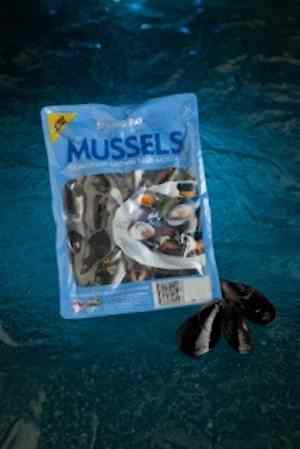 biotoxin Paralytic Shellfish Toxin (PST). Food products contaminated with Paralytic Shellfish Toxin (PST) may cause illness if consumed. Children and people with weakened immune systems may be more susceptible.
biotoxin Paralytic Shellfish Toxin (PST). Food products contaminated with Paralytic Shellfish Toxin (PST) may cause illness if consumed. Children and people with weakened immune systems may be more susceptible.
27 sick; almonds linked to Australian salmonella outbreak
It’s mildly entertaining to go to the shops in Brisbane and guess what 1980s song will be playing as background, while Amy dresses like Madonna in Desperately Seeking Susan and inflicts the same on Sorenne.
But it’s annoying to think Australians are stuck in the mid-1980s when it comes to communicating about food safety.
Food Standards Australia New Zealand (FSANZ) today urged consumers to check their pantries for raw almonds that might be contaminated with Salmonella, while revealing that  at least 27 people were sick.
at least 27 people were sick.
When Woolworths announced a recall of the almonds earlier this month several people from southeast Queensland e-mailed me and said, oh yeah, we got sick.
A couple of weeks later and there’s now 27 sick.
So, health types, when did you know people were sick, when did you make the association with almonds, who grew and processed the almonds, what preventative measures were taken by growers and the industry, given the history of Salmonella-related almond outbreaks in California, and what is your policy on informing the public about potential health risks?
Or should we all just go back to sleep?
Deputy FSANZ chief executive Melanie Fisher said, “The food recalls were notified earlier this month but we want to ensure consumers are carefully checking their pantries as packaged raw almonds are often bought to use later.”
I don’t know who talks like that, but I’m still learning Australian.
Smuggled food poses foot-and-mouth risk in Australia
Australians take disease control at the border seriously. Fly into any Aussie airport from overseas and your contents will be scrutinized; they also have some of the best dog snifferes anywhere, and they’re everywhere. There’s even a reality show about customs control.
So it’s no surprise a senate inquiry has heard banned food is being smuggled into Australia 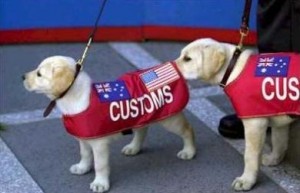 from countries with foot-and-mouth disease (FMD), jeopardising Australia’s agriculture.
from countries with foot-and-mouth disease (FMD), jeopardising Australia’s agriculture.
The Department of Agriculture, Fisheries and Forestry (DAFF) told a senate estimates hearing on Monday that smuggled goods posed a real risk to Australia, which has been free of FMD for more than 100 years.
Among the tonnes of illegal imports seized in raids this year have been food products, including more than 760kg of ice cream, from FMD countries.
The warning comes after a company director pleaded guilty in a Brisbane court last week to having dealt with illegally imported meat and dairy products from South Korea.
DAFF, in conjunction with Australian Customs and Border Protection Service and trading partners, has been running targeted campaigns, random cargo inspections and a hotline to crack down on illegal food imports.
One such campaign, known as Operation Hayride, was set up after DAFF uncovered during a routine inspection in late 2010, evidence of the deliberate import of banned foods.
DAFF selected 225 targets for inspection and raided more than 300 retail premises, discovering 132 tonnes of banned goods including meat and dairy products.
“One of the benefits with Operation Hayride was when you start digging you get more leads as you go,” said DAFF’s Tim Chapman from the Border Compliance Division.
Evidence from this saw company director Yoo Young Jack Kim last week sentenced to 12 months imprisonment for importing banned food from South Korea.
Australian man kicked out of a bar because of his mullet
Hockey player Wayne Gretzky had an amazing mullet while playing for the Edmonton Oilers in the 1980s.
This has nothing to do with food safety but does raise the question of priorities in some  Australian bars.
Australian bars.
According to Eater.com a man says he got kicked out of the Print Hall rooftop bar in Perth because he has a mullet.
Talking to The West Australian, David Hoogland said, “I’m not in a gang, I don’t have tattoos all over me, I’m just an everyday person.”
No, he has just proudly worn a mullet for the past ten years. Hoogland had been at the bar for half an hour before he was asked to leave “because of his hair.” The bar has as yet declined to comment on the matter.
According to one mullet-bearer, in Australia “some venues [believe] people with mullets or rat’s tails were more likely to become drunk and rowdy on a night out.”
I don’t see gender; everyone required to solve problems
Three-year-old Sorenne goes to daycare, and they have programs that parents pay extra for, like soccer.
 So I said, sign the 3-year-old up for an hour of soccer once a week.
So I said, sign the 3-year-old up for an hour of soccer once a week.
The female staff looked at me liked I’d lost it.
One said, we’ve never had a girl this young in soccer, it’s all boys, won’t she be intimidated?
I signed her up.
 Australia can be sexist like that. So can anywhere.
Australia can be sexist like that. So can anywhere.
When I first met Amy, I asked her what she did, and she said something about literature and feminist studies.
I giggled.
Because, like Stephen Colbert doesn’t see race, I don’t see gender.
I am a father with five daughters. Australian Prime Minister Julia Gillard’s speech in Parliament last night, which has apparently gone viral (although it could be edited down to 5 minutes rather than 15), touched a nerve. Any society that wants to solve any problem, food safety included, needs to empower both genders; otherwise you’re leaving out over 50 per cent of the brain power.
I can’t wait to load up on hockey equipment in the U.S. over Christmas and then come back and help Sorenne invent girls hockey (the ice kind) in Australia. And if she decides that’s not for her, OK.

